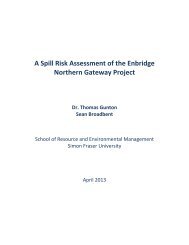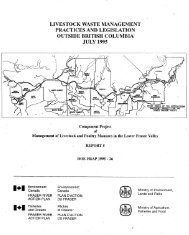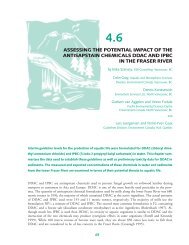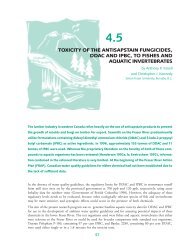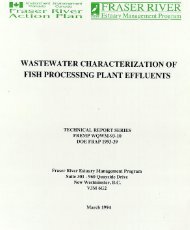9420.pdf
9420.pdf
9420.pdf
Create successful ePaper yourself
Turn your PDF publications into a flip-book with our unique Google optimized e-Paper software.
2 BACKGROUND INFORMATION<br />
2.1 General<br />
The fish and shellfish processing industry is faced with increasing problems of waste<br />
handling and disposal, plant sanitation, raw material availability and cost, production<br />
efficiency, increased competition (from other countries as well as other protein sources),<br />
and increasing Iabour and energy costs. At the same time regulations protecting the<br />
environment from pollution are becoming more stringent. If waste handling and operating<br />
costs significantly increase at fish processing plants, some plants may no longer find it<br />
profitable to stay in business.<br />
If pollution is viewed as an indication of an inefficient manufacturing process where both<br />
product and energy are wasted, then it maybe more cost effective to reduce pollution by<br />
improving the process rather than by adding expensive treatment facilities at the end of<br />
discharge pipes, which in turn produce sludge for later disposal. The ideal food<br />
processing plant takes in raw materials and generates products. Water and energy are<br />
efficiently recycled and byproducts are recovered for internal use or for external markets<br />
(Gates, 1991).<br />
2.2 Seafood and Marine Products in Canada and the West Coast<br />
The Canadian seafood and marine products industry is comprised of firms engaged<br />
primarily in the processing and marketing of fish, shellfish and marine plants and animals<br />
as well as by-products such as fish meal and fish oil (Ind. Sci. and Tech. Canada, 1991 b).<br />
Canadian fish products are harvested from oceans off Canada’s Atlantic and Pacific<br />
coasts as well as from inland freshwater lakes. These three fisheries are based chiefly<br />
on groundfish, pelagics, salmonides, molluscs, crustaceans and freshwater fish.<br />
The Canadian seafood and marine products industry is a major world exporter of such<br />
products. It provides hundreds of small communities with an important source of jobs<br />
and resources. Statistic Canada estimates that in 1990 there were 460 fish processing<br />
establishments in Canada employing 27,617 people, with 57 establishments (not including<br />
small enterprises) in B.C. employing 4,366 people (Table 2.1). Other estimates include<br />
smaller companies, and put the number of fish processing plants in B.C. in 1990 at 160<br />
3



